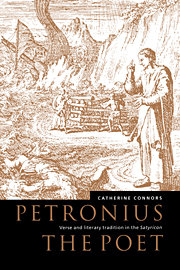Book contents
- Frontmatter
- Contents
- Prefatory note
- Acknowledgements
- List of abbreviations
- Introduction
- 1 Refashioning the epic past
- 2 In the frame: context and continuity in the short poems
- 3 Troy retaken: repetition and re-enactment in the Troiae Halosis
- 4 The Bellum Civile
- Epilogue
- Bibliography
- Index of passages discussed
- Index of subjects
4 - The Bellum Civile
Published online by Cambridge University Press: 28 October 2009
- Frontmatter
- Contents
- Prefatory note
- Acknowledgements
- List of abbreviations
- Introduction
- 1 Refashioning the epic past
- 2 In the frame: context and continuity in the short poems
- 3 Troy retaken: repetition and re-enactment in the Troiae Halosis
- 4 The Bellum Civile
- Epilogue
- Bibliography
- Index of passages discussed
- Index of subjects
Summary
Outside a python, a dead rat is nothing special to look at. Inside, though, it exerts a horrifying fascination. Likewise, the Satyricon's Bellum Civile, 295 lines on the war between Caesar and Pompey, would be nothing much if it survived only in an anthology, but in the Satyricon it seems quite odd; this bulky poem is a big chunk of undigested epic stuck implausibly in the belly of a narrative that has so far been consuming epic in bite-size pieces.
The temptation to treat the Bellum Civile as a literary conundrum, a cipher of Petronius' intentions, a mystery to be solved by careful detection, has been hard to resist. Is the poem designed to demonstrate that Eumolpus is an incompetent and hypocritical poetaster, unable to master conventional topoi in an artistically satisfying way? But Eumolpus is already an incompetent and hypocritical poetaster, so why introduce such a long poem to make the same point? Perhaps the practice of imitation is an end in itself, a demonstration of Petronius' literary expertise, the kind of thing boys learned to do in school and men tossed off at dinner? The poem treats the same subject as Lucan's Pharsalia Lucan's poem was remarkable for its exclusion of the traditional epic gods, and Eumolpus' poem includes traditional epic gods. Does Petronius polemically demonstrate literary principles to criticize Lucan? Could this critique be political as well as literary? Lucan, after precocious poetic success, joined those who plotted to assassinate Nero and install Calpurnius Piso in power.
- Type
- Chapter
- Information
- Petronius the PoetVerse and Literary Tradition in the Satyricon, pp. 100 - 146Publisher: Cambridge University PressPrint publication year: 1998

